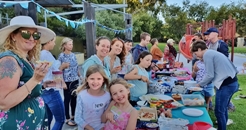 Resilience in turbulent times? The answer is community.
Resilience in turbulent times? The answer is community.
From a TEDx talk
Shani Graham is an educator, author, speaker and passionate community builder. She gave a talk in TEDx Perth, Australia about how getting to know your neighbours helps build a resilient community:
Thinking of bushfires, floods, big storms, in crises such as these, 90% of the support people receive in the first 24 hours comes from within 1 kilometre of their house.
It's neighbour helping neighbour - it's community. It's geographic community not a community of interests like a book club but a community of people randomly linked by the fact that they live close together.
I'm going to tell you a story about my community - its development, some lessons that we've learned along the way. Then I'm going to suggest something really important. I'm going to suggest the development of geographic community in good times is going to help us with potential hard times to come.
About four years ago, I presented a 'Living Smart' course in my community. It's a course for people who are worried about things like climate change and interested in the sort of changes they can make in their households to make themselves more sustainable and resilient.
One of the topics we covered is community. I became friends with one of the participants, Carrie. We looked at a map and identified 350 houses and we door-knocked these and left a flyer inviting them to a community picnic. About a hundred people came to that initial picnic. Neighbours met each other for the first time.
We had a map and people pointed out where they lived and we realised we had people from every street in the area. From these, we had volunteer co-ordinators to deliver flyers in the future. Every month, we started to organise something.
After some time, we decided not to have more meetings but encourage people to simply choose an activity they were passionate about and only meet, not for a meeting, but to have fun e.g. film in the park, games night, maker workshops, etc. Then we also had these subgroups that formed about passions - greening the area, community garden, yoga, history project recording long-term residents, etc.
The number of activities grew as did the number of people. Some events only had 6 people turn up. others had 100. We communicate through email, monthly flyers for the fridge and a website.
A strong community is an amazing place for the young to grow up in and the elderly to age in. We've got connection. We share resources. We feel safe and our hearts belong. But what's it got to do with resilience?
About a year after we began, we had a crisis - the pandemic. Resources were scarce. People were scared, worried, mourning, lost their jobs, were needed as essential workers - risking their lives. In our community however, we had established systems that made response easier. A local psychologist established a support team and we organized a hotline. Using our email list, we got 30 volunteers to help. We delivered a flyer to every household and contacted those we thought were vulnerable. We did all this within 24 hours - before any lockdown was imposed.
We received calls and did shopping, got sanitizer, picked up prescriptions, food, etc. We called vulnerable people daily, got emergency call buttons installed, built new friendships. Because we'd dealt with all those physical things, we were able to have lockdown fun and think about people's mental health. We hid teddy bears, organized scavenger hunts in the park, had Zoom drinks, had a singer and a pianist on the back of a pickup driving around our little community taking song requests.
So what have we learned over the last four years or so, is that there's a difference between a community of interest and a geographic community. If you live outside of the area you can't join in. If our focus moved outside, we would lose the focus on the people in that small community who probably wouldn't join in without that direct contact. We are exclusively inclusive.
Everyone's astonished as to how you actually organize 27 events in 12 months with no meetings. This is how you do it if anyone has got an idea that sounds good. Did you want to talk about it? No. Did you need any help? No. Fantastic. Everyone happy with that? Great. Pick a date. Ok, next idea. We do delegate but we trust each other. Whoever's in charge is in charge. We don't need long discussions or consensus decision making. We trust and we delegate.
People are so happy to do something specific within a set time frame. We do ask permission from the people who are going to be impacted by the actions that we take e.g. use of street.
We've been amazed at the number of resources within the community - physical things, skills, expertise, willingness to help. We've operated for nearly four years now without any money and any external support. I've got to know 76% of the people in the community and 52% of them have come to some sort of event.
The main lesson we've learnt is that the things we did to establish such a strong and safe community were the things that helped us through the Covid crisis. What you can do in good times is going to help with the bad times. You can be resilient, you can be prepared and in preparing you will create the sort of place where you feel safe and your heart belongs.
Listen to the 17 minute talk here:
How much does our reliance on the state in the UK to handle a crisis weaken community and therefore weakens our resilience? Could you be a gamechanger here?
Retweet about this article:
From a TEDx talk, 09/04/2024